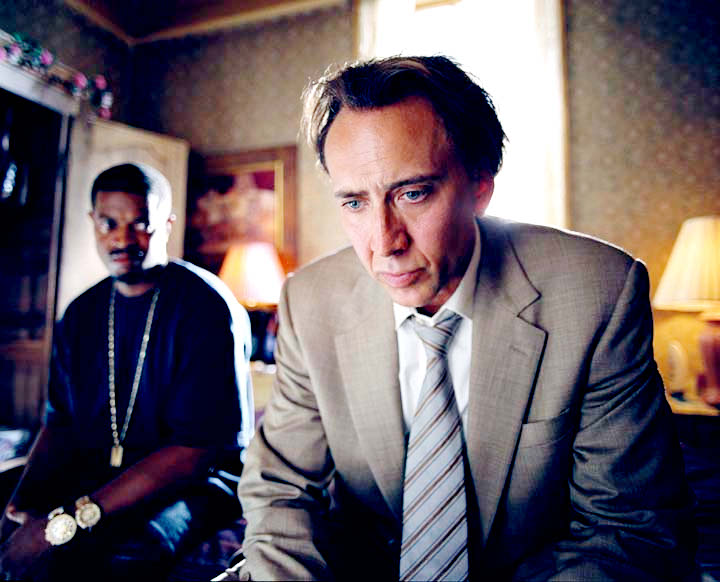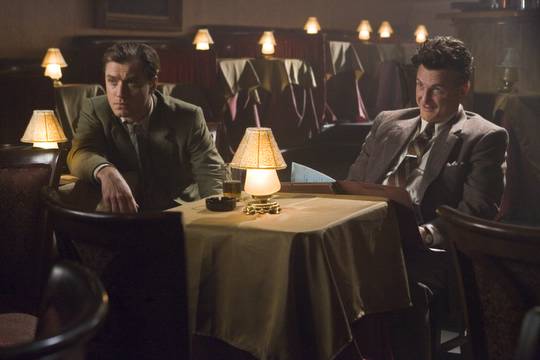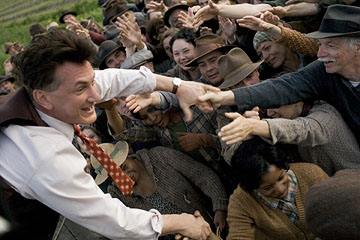
“
I was right in the middle of a f**king reptile zoo, and somebody was giving booze to these godd**n things!” For reasons that will be apparent if you see the movie, the memorable lizard sequence from
both versions of
Fear and Loathing in Las Vegas comes to mind while watching
Werner Herzog’s highly entertaining Bad Lieutenant: Port of Call New Orleans last Friday. And for good reason — with both imaginary iguana and melancholy crocodile POV shots herein, not to mention sharks, dogs, fish, and sundry other of God’s creatures well-represented, the animals are basically running the compound in Herzog’s Big Easy. And the king of the animal kingdom here is a primal, animalistic, and drugged-out-of-his-gourd anti-hero, Nicholas Cage. Yes, folks, he’s been given a whole lot more than booze…Let the wild rumpus start!
Partly a Chandleresque crime movie in the key of Southern Gothic (it made for a great counterpoint to my weekend immersion into L4D2, which also takes place in the Quarter), and theoretically a remake of Abel Ferrara’s tortured Harvey Keitel vehicle of 1992, Bad Lieutenant: Port of Call New Orleans is a dark acidhead comedy that’s much more freewheeling and enjoyable than I expected going in. And, rather than get bogged down and belabored by the arch-Catholic, sin-and-redemption motifs of the Ferrara version, Herzog and Cage mostly just groove along here to a trippy gonzo beat. The good Doctor‘s soul is still dancing.
After a swimming snake sets the stage for the proceedings, Bad Lieutenant: Port of Call New Orleans begins with, and mostly centers around, the shady escapades of one Lt. Terence McDonagh (Cage, more on him in a bit.) Ostensibly some of the Big Easy’s, uh, finest, McDonagh and his partner (Val Kilmer, not given much to do) are surveying the mid-Katrina wreckage of their precinct when McDonagh figures out that someone is locked in the flooding underground jail. They go downstairs, find this poor, trapped prisoner, and proceed to heckle him and make sidebets on his unlikely survival. But, eventually — and for reasons that seem unclear even to himself — McDonagh jumps into the murky, fetid waters to save the guy. And since no good deed goes unpunished, he is repaid with a excruciatingly painful back injury that puts him on Vicodin for the rest of his life. Well, that and a promotion.
Cut to six months later, and now-Lieutenant McDonagh finds himself with a new lurch in his step, several high-maintenance addictions to feed, and a big case brewing — the execution-style murder of five Senegali immigrants, including two small children. The cops have a pretty good sense of who the prime suspect probably should be: the local drug kingpin, Big Fate (Xzibit). But they have nothing to pin on him, and neither his two lieutenants nor anybody else seem to be talking. And in fact, McDonagh doesn’t particularly seem to care about the case — he’s too busy with his extracurriculars, which include but are not limited to: garnering choice illegal drugs by means foul or fouler, getting in way too deep with his long-suffering bookie (Brad Dourif), and/or keeping his hooker girlfriend Frankie (Eva Mendes) in the style to which she’s accustomed. Still, amidst all the lines of coke and the freebasing, something’s nagging at him lately — is that a pang of conscience struggling to break free, or is he just fiending for another massive hit?
Y’know, it’s easy to playa-hate on Nicholas Cage, and I’ve been known to indulge in it myself. And it’s true that, on account of his well-publicized money problems, the guy will appear in just about anything, from PG-ish family-fare (National Treasure, which I actually enjoyed) to slapdash genre pics (Knowing, Ghost Rider, Bangkok Dangerous) to out-and-out crap (LaBute’s Wicker Man travesty.) Still, his wild, weirdly hypnotic performance here in Bad Lieutenant reminds us that he’s also an exceedingly rare bird, and he’s given us more than his fair share of quality turns in the past, from Raising Arizona and Wild at Heart to Adaptation and Lord of War. (Not to mention his tour de force in Werewolf Women of the S.S.) Say what you will about the man, but from Vampire’s Kiss to Leaving Las Vegas to this flick, he’s not afraid to let it all hang out.
Of course, it helps to be aided and abetted in your crazy-man schtick by none other than Werner Herzog, who knows a thing or two about certifiably nutso leading men. (See also: Grizzly Man.) A lot of reviews seem to argue that this movie has absolutely nothing to do with Abel Ferrara’s Bad Lieutenant, but that’s only half true — A lot of the plot points remain the same: the carnal appetites, the grotesque abuse of power for sexual ends, the losing gambling streak, the conscience-tugging case despite it all. Where the difference lies, and why the films seem completely distinct, is in the valence of the tale. Ferrara’s movie (and Keitel’s performance) is grim, haunted with Catholic remorse and self-loathing, and, frankly, not much fun at all. But Herzog’s film, even in the most decadent parts, abstains from judgment, or even seems vaguely bemused by all the sordidness. (Also, fwiw, Herzog has replaced all the Biblical allusions of Ferrara’s movie with Cajun voodoo and animal/nativist spirits.)
Simply put, Bad Lieutenant: Port of Call New Orleans is clearly a film made by a man who’s comfortable with teh crazy. And, rather than condemn all the druggy depravities on display here, Herzog keeps a light touch, and usually just lets them unfold without much editorial comment. As our dear late Hunter Thompson put it on his own drug-inspired binge, “Buy the ticket, take the ride.”







